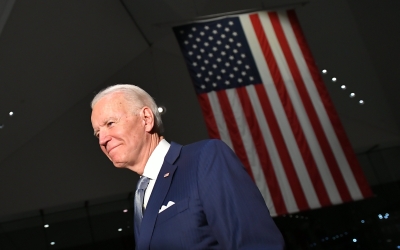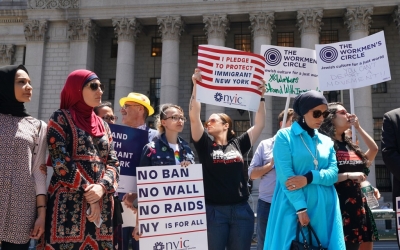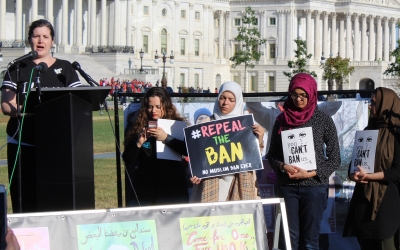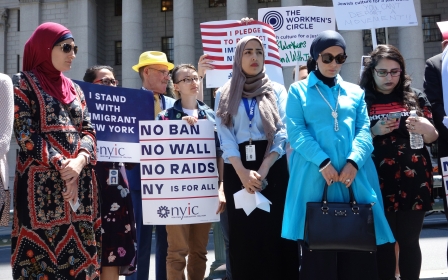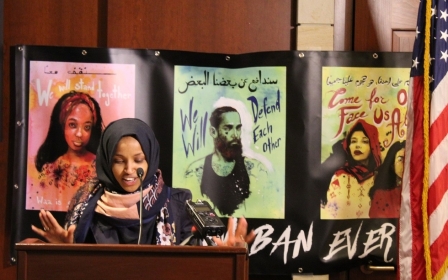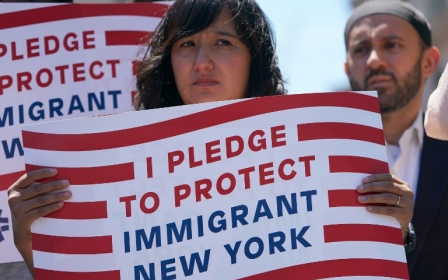US House passes No Ban Act in opposition to Trump's 'Muslim ban'
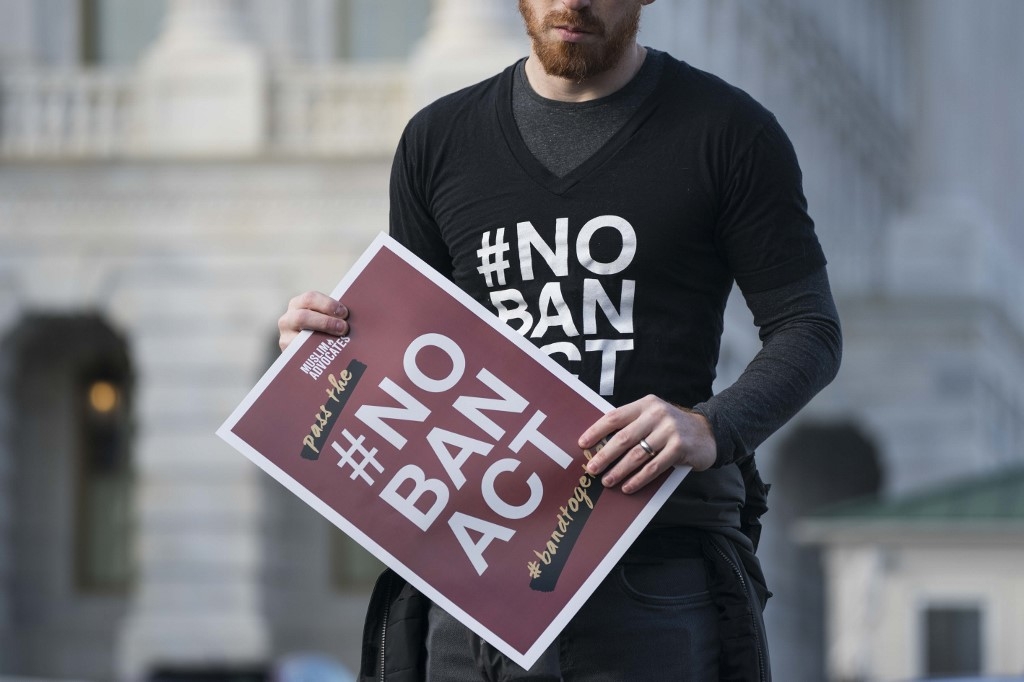
The US House of Representatives passed a bill that would repeal President Donald Trump's "Muslim travel ban", but the legislation is unlikely to pass in the Republican-led Senate.
In a 233-183 vote on Wednesday, the House passed the No Ban Act, largely along party lines, with 230 Democrats and two Republican voting in favour, 181 Republicans and one Independent voting against and 15 lawmakers abstaining.
If passed into law, the legislation would bar the executive branch from banning people from entering the US on the basis of any religious affiliation, effectively expanding existing anti-discrimination immigration law.
An accompanying bill, also passed on Wednesday along party lines, would require that those selected by border control for secondary screenings at points of entry be provided access to a lawyer within the first hour of questioning.
While the No Ban Act passed easily in the House, Senate Majority Leader Mitch McConnell will likely refuse to bring the legislation up for a vote in the Senate, blocking the possibility for the bill to become law.
New MEE newsletter: Jerusalem Dispatch
Sign up to get the latest insights and analysis on Israel-Palestine, alongside Turkey Unpacked and other MEE newsletters
This has led many to call the legislation largely symbolic. Still, Maya Berry, executive director at the Arab American Institute, told Middle East Eye that she whole-heartedly disagreed with that label.
"I don't agree that this legislation is symbolic," Berry said. "The fact that this legislation is going to end up in Senator Mitch McConnell's graveyard of other important legislation that should have passed is not a testament of it being symbolic, but rather to the lack of leadership we're seeing right now from our three branches of government."
"On the Senate side, in terms of the Republican leadership, it is not providing the type of oversight that's needed. There's no question that this was an overreach by President Trump and there's no question that it was bigoted from the beginning," Berry said.
"[Trump] said so, he didn't leave any room for questions, he said during the campaign and he said so when he implemented it," Berry said, alluding to comments made by Trump in the past, including his 2015 campaign promise to implement "a total and complete shutdown of Muslims entering the United States".
While the bill has little chance of being signed into law under the Trump administration, Democratic presidential candidate Joe Biden, said during a public online discussion with Muslim organisations on Monday, that, if elected president, he would remove the ban "on day one".
The travel ban, which remains active, is the third version of the Trump administration's executive order, sometimes referred to as the Muslim Ban, the first two having been knocked down in the US court system.
The original travel ban was introduced in January 2017, during the president's first week in office.
In 2018, after a myriad of legal challenges, the Supreme Court upheld the current, third version, in a 5-4 ruling.
The ban bars all immigrants and travellers from Muslim-majority Iran, Libya, Somalia, Syria and Yemen, as well as from Venezuela and North Korea. In February, the Trump administration released a new extension to the travel ban to include Sudan, Tanzania, Nigeria, Eritrea, Myanmar and Kyrgyzstan.
The House vote was scheduled and postponed several times before being brought to vote on Wednesday. The legislation would in no way affect travel bans implemented for public health concerns, such as the coronavirus pandemic.
On the House floor
During Wednesday's hearing before the vote, Representative Judy Chu, a Democrat from California who introduced the legislation, recalled the first week of the Trump administration's Muslim ban, when she was contacted by advocates at the international airport in Los Angeles (LAX) and informed that dozens of people previously cleared for entry into the US were being detained under the executive order.
"I will never forget that terrible day in January 2017," Chu said on the House floor. "I was on my way to a community event when I received a frantic call about 50 Muslims with Green Cards who were being detained at LAX for hours with no end in sight.
"At that moment I decided to drop everything and help in any way I could. I rushed over to LAX to advocate for these people. And once I arrived, I found that indeed there were scores of people with a legal right to be here, kept for hours without food and blocked from receiving legal advice from an attorney," Chu said.
Several other Democratic lawmakers shared similar stories of being called to airports across the country, as refugees, legal residents and others previously permitted US entry, were being held and threatened with deportation over the ban.
"These were individuals that were cleared by the State Department to enter the United States," Representative Lou Correa, a Democrat, said on the House floor after recalling a story similar to that of Congresswoman.
Republican opposition
Republicans, including Representatives Doug Collins and Andy Biggs, spoke out against the legislation and widely accused Democrats of backing the bill purely as a move against Trump.
"The real intent of this bill is about this president, not about the law," Congressman Collins said, speaking against the measure.
Berry said she was shocked that Republicans, largely seen as a party that holds religious freedoms to its core, would have an issue with adding religion to the category of protections that cannot be used to refuse US entry, pointing to their opposition as bad faith politicking.
"The idea that there's any member today who would oppose adding religion to protected groups is pretty remarkable, and to consider that it comes from those on the right who hold up religious liberty often is profoundly confusing," Berry told MEE.
During his comments, and later on Twitter, Collins falsely asserted that the legislation - which focusing purely on religious based bans - would have blocked coronavirus-related travel restrictions from being ordered by the White House.
Congressman Biggs, a Republican from Arizona, criticised the measure's main aim, as well as the accompanying measure set to provide counsel to those being held at points of entry.
"If you get down to the border and spend time, as I have many times, you're going to see the secondary inspections are short and perfunctory - they don't need counsel," Biggs said.
"They almost always turn out well for the person that's delayed, except for when they are a danger. That becomes a problem. They [would then] get an opportunity for counsel, because now you have a criminal focus on them. That's key here," Briggs said.
Secondary border patrol screenings can in reality last anywhere from a few minutes to several hours. Under current US law, non-citizens have the right to contact their embassy or consulate during the secondary screening process, but have no right to call an attorney.
Middle East Eye delivers independent and unrivalled coverage and analysis of the Middle East, North Africa and beyond. To learn more about republishing this content and the associated fees, please fill out this form. More about MEE can be found here.


